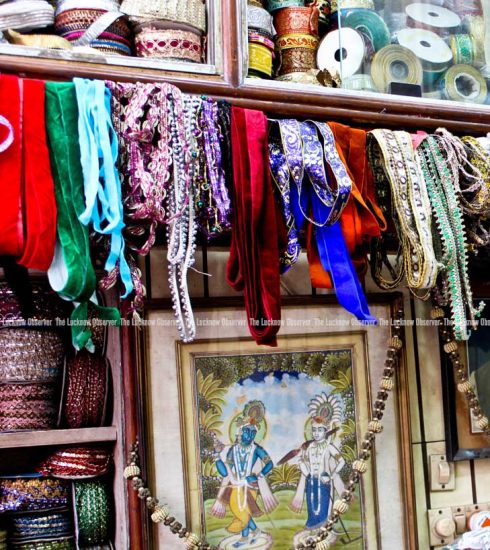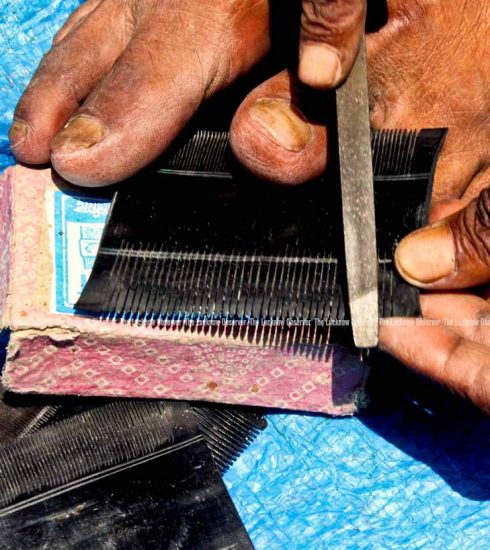Men for Women
One hundred years after European women tried to stop the start of World War I in 1914 by holding rallies across the continent; the voice of women is louder than before. It is true, that patriarchy is responsible for trying to silence women, but many men also have stood by women in every age.
One of the city’s most favoured poets Asrarul Haq Majaz said many decades ago that the beauty of the women of Lucknow is the envy of Egyptian women:
Rashk-e- zananey misr, kaneezaney Lucknow…
The turn of the 19th century turned out to be an exciting time for women who wanted to be heard. Widespread education had endowed women with a new voice. The reformist movement was in full swing in India and women were encouraged even by the patriarch to rebel against colonial rule in whatever way they could. The era saw the birth of many female writers in different parts of the country who questioned the dominance by men in their writing and were supported by men.
In Maharashtra, Savitribai Phule wrote about women’s education and Pandita Ramabai Saraswati wagged her finger at the patriarchal reading of Hindu scriptures, both nudged on by their respective husbands.
In the world of Urdu literature, men stood up for the rights of women. Together with his wife Muhammadi Begum, Sayid Mumtaz Ali launched Tahzib-un-Niswan in Lahore in 1898. Khatun, a monthly women’s magazine was published by Shaikh Abdullah and Waheed Jahan Begam from Aligarh between 1904 and 1914, followed by Ismat published from Delhi in 1908 by Rashidul Khairi, a male Urdu novelist.
Khairi was in the forefront of a public debate on the rights of women in Islam. He felt that men have to undergo a change of heart regarding women. In 1912, he wrote that the duty of women is not simply to populate the world or to make life comfortable only for others.
Exactly a hundred years ago in March 1913, the editor of Ismat had found the story of women’s rights heartrending.
“Women are oppressed day and night and find no relief from their fate. Blessed will be that time when a spirit of sympathy (for women) will spread (among men) upon the earth. Torment will change into paradise and sorrows will change into happiness. Even when going to their graves, husbands do not recognize the oppression they have visited upon their wives. Nor has news of the rights which Islam has given them reached women’s ears,” wrote Khairi, inviting both male and female readers to talk about purdah, education and the role of religion in women’s life.
Besides these three men to publicly take up the cause of women in the media, there were other social reformers, some of whom published women’s magazines in Urdu and others in different vernacular languages including Hindi and Bengali.
Nehru
Then there was Jawaharlal Nehru, India’s first Prime Minister who felt that the seclusion of women is one of the most unfortunate developments in India. In A Discovery of India, written during his imprisonment in 1942-1946 at the Ahmednagar Fort, Nehru says that he has no doubt that among the causes of India’s decay in recent centuries, purdah or the seclusion of women holds an important place:
I am even more convinced that the complete ending of this barbarous custom is essential before India can have a progressive social life. That it injuries woman is obvious enough but the injury to man, to the growing child who has to spend much of its time among women in purdah and to social life generally is equally great. Fortunately, this evil practice is in fact disappearing among the Hindus, more slowly among the Muslims. The strongest factor in the liquidation of purdah has been the Congress political and social movements which have drowned tens of thousands of middle class women into some kind of pubic activity.
Yashpal
The unequal status of women was an obvious concern of revolutionary Hindi novelist Yashpal. Born in 1903 and brought up by his mother who earned Rs 30 per month as a teacher, the author of Divya, published in 1945 takes the struggle of his protagonist to first century BC India as if to say that time has made no difference to the fortunes of women.
Divya may have lived long ago but her story continues to be the story of a majority of women even today:
In a voice devoid of any emotion, Divya asked the Acharya, “What further orders await this unfortunate creature?”
Sitting down on the mat spread by the guard, the Acharya said, “Devi, your place is not that of a dancer courtesan. You are of high birth. Your place is that of the mistress of a noble family. I am here to offer you the place of the first Lady in the house of the Acharyas. Devi, oblige me by accepting the offer.”
Her eyes fixed steadily on the face of the Acharya, Divya replied, “Acharya, the place of the mistress and of the first lady of a noble family, is a rare honour. This destitute woman bows her head before the offer of such a high place. But Acharya, the mistress of a noble family is not a free woman; she is not independent like a disreputable courtesan. Learned Acharya, the honour given to the noble bride, the respect given to the noble matron, and the authority given to the first Lady are there because of the man who gives her protection. It is not an honour due to the woman; it is an honour due to the powerful man who owns her. Arya, this honour and respect can be obtained by a woman only by willingly surrendering her inner self.”
After a few moment’s silence, she continued, “Learned sir, what is left of the woman who has given up her self? The Acharya must forgive this humble servant. Even though destitute, she wishes to live independently. By losing her self she cannot remain alive.”
Just then, the bhikshu approached the seat of the Acharya, and said, “Devi, I, Bhikshu Prithusen, a devotee of the Buddha, am here to receive into the bosom of the Buddha the woman oppressed by society.
Divya’s eyes opened wide as she heard and recognised the voice of the bhikshu standing in front of her. A shudder ran through her body. She heaved a deep sigh and sat motionless, looking at the face of the bhikshu. Bhikshu Prithusen raised his hand in benediction and said, “Devi, by the mercy of the Buddha, it has been possible for you to realise that attachment and infatuation are only illusions. Devi, peace does not lie in riches, nor in prowess, or in the gratification of the senses. Everlasting peace lies only in Nirvana. Devi, no sorrow of the world can mar the beatitude that lies in Nirvana. The unhappy ones of the world, oppressed by society, find peace in the shelter of the Buddha, in the shelter of the True Faith, in the shelter of the Monastic Order. Come into the sanctuary of the Infinite Mercy.” …
Her eyes lit up again. In a voice trembling with emotion, she said, “Honoured sir, what is the position of a woman in the religion of the bhikshu?”
In a calm voice the bhikshu replied, “Devi, the bhikshu’s purpose is Nirvana. The woman represents temptation. As such, she is a hindrance in the path to Nirvana and, therefore,has to be given up.”
“Honoured sir, then follow your religion of Nirvana,” Divya replied in a slow but firm voice.
“A woman’s religion is not Nirvana but creation. Let the bhikshu permit her to follow herownpath.”
When his chance came to speak, the traveler from the East drew near and addressing Divya, said, “I am Marish. I have come all the way from Mathurapuri to be near you, Devi.”
Once again Divya’s eyes opened wide and lit up with wonder and curiosity. The traveller, covered with dust from head to foot, said, “Devi, I cannot offer you the place of the First Lady in a royal palace; I cannot give you the assurance of the eternal joys of Nirvana. I live in the midst of the joys and sorrows of this world. Experience and reflection are my only assets. I can only offer to share those feelings and experiences with you. I am a traveler along the world’s rough and dusty roads. On that journey, impelled by the desire for your womanhood, I offer my manhood to you. I want an exchange of support. In this fleeting life I can only offer a feeling of fulfillment.”
He paused for breath, and added, “By reproducing my kind, I can try to add another link to the chain of human continuity.”
Divya sat quietly for a few moments, lost in thought. Then no longer needing the support of the wall, she stretched out both her hands towards Marish. In a tremulous voice, she said, “Grant me the abiding shelter of your arms, Arya.”
Zaheer
According to Mulk Raj Anand London ki ek raat by Marxist thinker and revolutionary Sajjad Zaheer was the best work of Urdu fiction when it was written in 1938.
The founder of the Progressive Writers’ Movement who was born in 1905 in Lucknow describes about a dozen characters in his slim book who meet for an evening in a London home. This is perhaps the first book of its kind to expose the thoughts and feelings of young Indians in London in the mid 1930s like Arif introduced by the Urdu novelist as one who knows the price of everything but the value of nothing.
Karima Begum is his female counterpart, the spiritual equivalent of the suburban lady who pretends to be genteel. She is the sort of person whose arrival has cast a gloom over the party and who lives to make nasty remarks in a seemingly innocent way. She is angry when she is not the centre of attention at the party and she is moral out of convention and not conviction. Her criticism of what she calls European ways is based more on the jealousy she hides of English girls:
Their arrival immediately strikes a note of discord in the pleasant talk between Sheila and Naim. I’m sorry, perhaps we have arrived a little earlier than expected and caused you trouble, ‘said Arif. ‘The fault’ smine, ‘said Karima Begum with a jolt.
‘I saw Arif Sahib at the students’ association where I had gone to hear a lecture. It got over early and so I mentioned to Arif Sahib about my coming to your place. He said that he too was invited and both of us took off without taking notice of the time,’ she smilingly eyed the English girl who turned to acknowledge both of them…
The English girl left her place near the curtains and moved towards the fireplace. Arif and Karima sat down as well and all three of them gazed at each other.
Naim took Arif’s and Karima’s coats and hung them on a peg in the corner. Upon returning he offered everyone a cigarette.
“No thank you I don’t smoke,” said Karima in a faint, doll-like voice.
Naiyer Masud
This 1936 born Urdu writer from Lucknow writes in a very special way about women. Masud’s dream like story called Nusrat is based on a person he knew as a child:
I do not remember the story of the bad woman now. But in those days I took a keen interest in it. I remember I was overjoyed learning that her case would be heard at our place, and that she would herself come over to see it settled. Prior to this, the case of another notoriously bad woman had also been heard at our house and my elders had brought it to a near conclusion. But that happened when I was still in my nonage. I had only heard others speak of her and they kept discussing her case amongst themselves until the case of this second bad woman came along and absorbed their attention.
On the day she was due to arrive, the outer room of our house was given a thorough clean up, and later furnished with additional seats, several curios some of them centuries old were added to enhance the room’s decor. The elders also called on me to help tidy up the place, and I did what was required of me with considerable enthusiasm. As I was moving a chair, I guessed from the conversation of my elders that was the chair the woman would have to sit in. My heart began to pound. I could almost see her sitting right there. In fact, what aroused my interest in the matter was the opportunity it offered of looking squarely at a bad woman.








